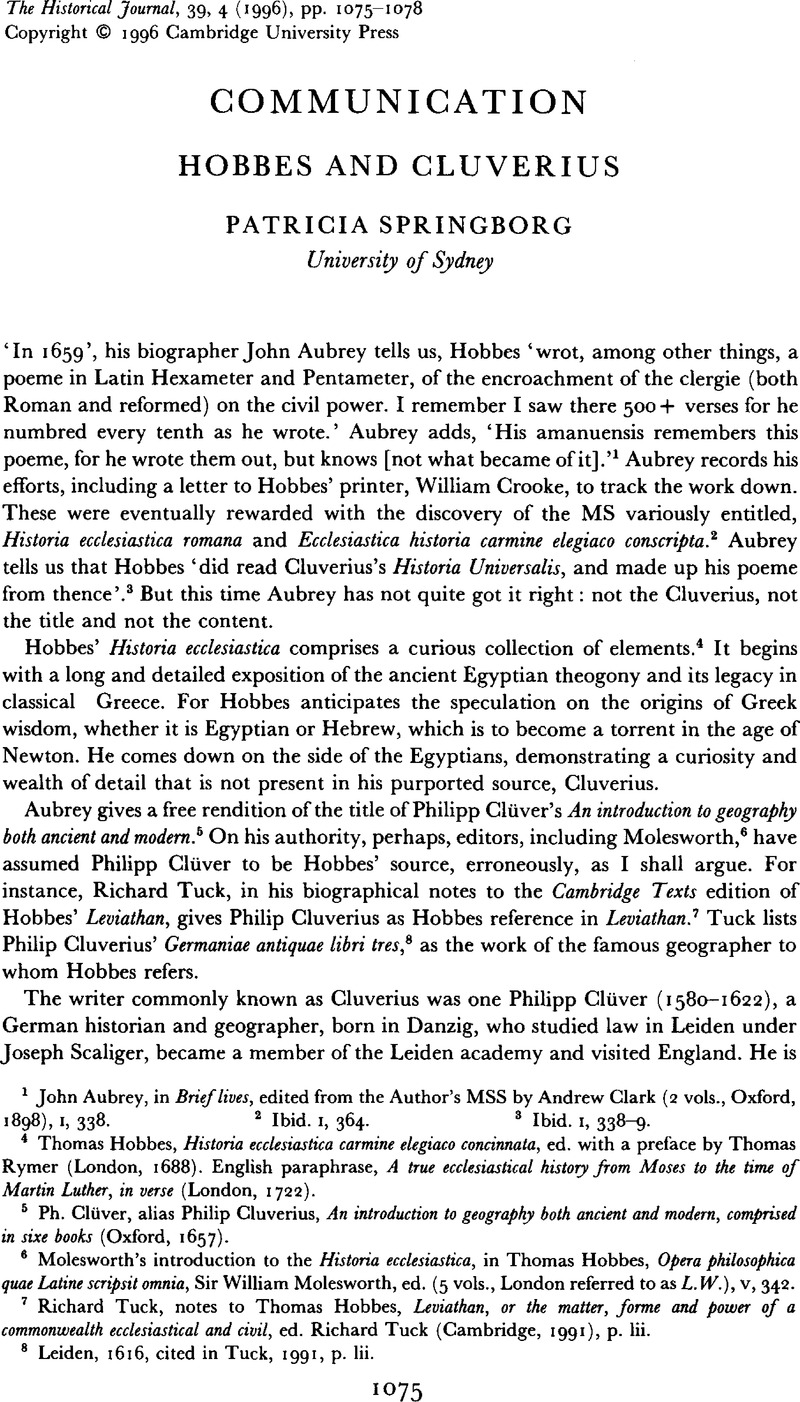Article contents
Hobbes and Cluverius
Published online by Cambridge University Press: 11 February 2009
Abstract

- Type
- Communication
- Information
- Copyright
- Copyright © Cambridge University Press 1996
References
1 John, Aubrey, in Brief lives, edited from the Author's MSS by Andrew, Clark (2 vols., Oxford, 1898), I, 338.Google Scholar
2 Ibid. I, 364.
3 Ibid. I, 338–9.
4 Thomas, Hobbes, Historia ecclesiastica carmine elegiaco concinnata, ed. with a preface by Thomas, Rymer (London, 1688)Google Scholar. English paraphrase, A true ecclesiastical history from Moses to the time of Martin Luther, in verse (London, 1722).Google Scholar
5 Ph. Clüver, alias Philip, Cluverius, An introduction to geography both ancient and modern, comprised in sixe books (Oxford, 1657).Google Scholar
6 Molesworth's introduction to the Historia ecclesiastica, in Thomas, Hobbes, Opera philosophica quae Latine scripsit omnia, SirMolesworth, William, ed. (5 vols., London referred to as L.W.), V, 342.Google Scholar
7 Richard Tuck, notes to Thomas, Hobbes, Leviathan, or the matter, forme and power of a commonwealth ecclesiastical and civil, ed. Richard, Tuck (Cambridge, 1991), p. lii.Google Scholar
8 Leiden, 1616, cited in Tuck, 1991, p. lii.
9 Clüver, 1657, pp. 287–8.
10 Clüver, 1657, p. 38.
11 Clüver, 1657, p. 36.
12 Clüver, 1657, pp. 334–5.
13 Clüver, 1657, p. 316.
14 See Martin, Bernal, ‘Black Athena: the African and Levantine roots of Greece’, in African presence in early Europe. Journal of African Civilizations, VII, 5 (1985), 66–82Google Scholar; Martin, Bernal, ‘Black Athena denied: the tyranny of Germany over Greece’, Comparative Criticism, VIII (1986), 3–69Google Scholar; Martin, Bernal, Black Athena: the Afro-Asiatic roots of classical civilization (2 vols., London, 1987, 1992)Google Scholar; Patricia, Springborg, Western republicanism and the oriental prince (Cambridge, 1992), chs. 7–10.Google Scholar
15 Historia ecclesiastica, lines 170–200, 1688 edn, pp. 9–10; 1722 edn, pp. 12–15.
16 Historia ecclesiastica, lines 240–80, 1688 edn, pp. 12–14; 1722 edn, pp. 17–19.
17 In The English works of Thomas Hobbes, ed. SirMolesworth, William (11 vols., London, 1839–1845, referred to as E.W.), VI, 278–9.Google Scholar
18 Historia ecclesiastica, 1688 edn, p. V; 1722 edn quoted here, p. iii.
19 Clüver, 1645, Preface, p. ii.
20 Clüver, 1645, p. 4.
21 On the competing claims to ancient wisdom of the Egyptians and the Israelites, see Paolo, Rossi'sThe dark abyss of time, Cochrane, Lydia G., trans. (Chicago, 1984)Google Scholar; John, Gascoigne, ‘“The wisdom of the Egyptians” and the secularization of history in the age of Newton’,Google Scholar and Trompf, Garry W., ‘On Newtonian history’, in Stephen, Gaukroger, ed., The uses of antiquity (Dordrecht, 1992), pp. 171–212, 213–49.Google Scholar
22 Clüver, 1645, p. 78.
23 Clüver, 1645, Preface, p. iii; Hobbes, , Historia ecclesiastica, 1688, pp. 8–9.Google Scholar
24 Clüver, 1645, p. 14.
25 Clüver, 1645, p. 17.
26 Clüver, 1645, p. 16.
27 Clüver, 1645, p. 6.
28 Clüver, 1645, Preface, p. v.
29 Clüver, 1645, book 7, pp. 164ff.
30 Clüver, 1645, p. 353. The term homoousion, ‘one substance’, was used by the Council of Nicaea, a.d. 325, to define the doctrine of the Trinity, as opposed to the term homoiousion, ‘like substance’, favoured by the Arians. It is interesting that the OED gives the first English reference to the term as Gibbon, , Decline and fall, II.xxi, pp. 251, 252Google Scholar: ‘Their [sc. the Arians'] patron, Eusebius of Nicodemia, … confessed, that the admission of the Homoousion, or Consubstantial … was incompatible with the principles of their theological system’; ‘The mysterious Homoousion, which either party was free to interpret according to their peculiar tenets’.
31 Clüver, 1645, book 9, pp. 351ff.
32 Clüver, 1645, Preface, p. V.
33 See Patricia, Springborg, ‘Hobbes, heresy and the Historia ecclesiastica’, Journal of the History of Ideas, LV, 4 (1994), 553–71.Google Scholar
- 3
- Cited by


